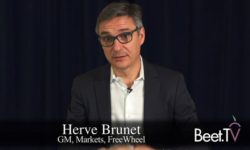MIAMI – If you could change just one thing tomorrow that could speed up the advanced-television business, what would that be? Maybe nothing that would have an immediate impact on the way things were done—inertia being what it is—but it’s good to ponder the question anyway.
This was the approach taken by Ashley J. Swartz, CEO of Furious Corp., which specializes in linear TV and video yield optimization, as she capped off the proceedings at Beet Retreat Miami in November.
The final panel of this year’s conference featured Anupam Gupta, Chief Product Officer, 4C Insights; Daniel Harrison, Head of TV Solutions for Oracle Data Cloud; and Jakob Nielsen, CEO of GroupM’s Finecast addressable TV business.
Declaring that “TV needs to change,” Gupta pointed out that while so-called enemies like Facebook and Google require advertisers to “do it their way” behind walled gardens, at least those companies offer application-programming interfaces. Those API’s facilitate valuable things like ad buying, targeting, reporting, measurement, creative testing and creative trafficking.
“Where are the API’s for the one trillion impressions” that comprise traditional TV?, Gupta asked.
Harrison said the Retreat was a great place for him to gain a better understanding of the financial and technical complexities of advanced TV. His reflections:
“You have to be able to adjust and redirect to achieve your goals. Coming from an Oracle Data Cloud perspective, I’m a bit neutral to all of this because regardless, we look at data as the fuel for innovation and it’s how do we enable this data in every and any place that a client wants this to be to achieve some goals.”
Nielsen warned that progress will be curtailed if agencies and tech suppliers make things too complicated for marketers. Said he: “One thing I’ve seen with advertisers is they are super excited about what we’re talking about. They’re seeing benefits of household targeting, using their own first-party data, to be able to do creative rotation in a different way, near-time optimization. That’s a journey that we’re on. We have to remember to take them on that journey, make it simple, give them what they need but don’t give people too much.”
Swartz suggested that it’s “human problems, not technology problems, that are holding us back.” This led to a discussion about current business models and methods that, while familiar and comfortable, won’t move things ahead at the desired speed.
Gupta described attending meetings with agencies and marketers in which everyone understands the importance of more data-driven TV audience buying. When he asks how they are currently executing it, responses typically include Microsoft Excel. “Then we say okay how are you processing large-scale datasets? ‘Well we don’t have the engineers to take second-by second-data from ten-plus million devices,’” Gupta related. “The point is, you’ve got business issues around talent, around the software not being there, around the horsepower not being there. Those are the issues holding you back. It’s not the desire to do something.”
Said Harrison: “Innovation doesn’t happen because you desire it. It’s because you must do it. You really don’t have a choice.”
Nielsen said there are too many tech solutions and there should be more use of fewer of them going forward. He offered these examples:
“We use Videology within Finecast to do some of the decisioning we’re doing and we have Sky in the UK use Videology as well. We work with Invidi in Australia, they won a fantastic deal with Foxtel, and we were very supportive of that. We went in nearly hand-in-hand and said we suggest you pick Invidi because that works with our systems and that means we can spend more money with you.
“The unpleasant part of that is there’s tons of technology companies that won’t exist in the future because there’s simply too much and it’s too complex.”
This video was produced at the Beet Retreat Miami, 2017 presented by Videology along with Alphonso and 605. For more videos from the event, please visit this page.



























